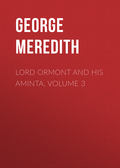
George Meredith
The Amazing Marriage. Complete
Merely to hear, for no other reason,’ a peace-loving crowd of clerks and tradesmen, workmen and their girls, young aspirants to the professions, night-larks of different classes, both sexes, there in that place for simple entertainment, animated simply by the spirit of English humour, contracted, so closing upon the Mackrell party as to seem threatening to the most orderly and apprehensive member of it, who was the baronet, Sir Meeson Corby.
He was a man for the constables in town emergencies, and he shouted. ‘Cock Robin crowing’ provoked a jolly round of barking chaff. The noise in a dense ring drew Fleetwood’s temper. He gave the word to Kit Ines, and immediately two men dropped; a dozen staggered unhit. The fists worked right and left; such a clearing of ground was never seen for sickle or scythe. And it was taken respectfully; for Science proclaimed her venerable self in the style and the perfect sufficiency of the strokes. A bruiser delivered them. No shame to back away before a bruiser. There was rather an admiring envy of the party claiming the nimble champion on their side, until the very moderate lot of the Mackrells went stepping forward along the strewn path with sticks pointed.
If they had walked it like gentlemen, they would have been allowed to get through. An aggressive minority, and with Cock Robin squealing for constables in the midst, is that insolent upstart thing which howls to have a lesson. The sticks were fallen on; bump came the mass. Kit Ines had to fight his way back to his mate, and the couple scoured a clearish ring, but the gentlemen were at short thrusts, affable in tone, to cheer the spirits of the ladies:—‘All right, my friend, you’re a trifle mistaken, it ‘s my stick, not yours.’ Therewith the wrestle for the stick.
The one stick not pointed was wrenched from the grasp of Sir Meeson Corby; and by a woman, the young woman who had accosted my lord; not a common young woman either, as she appeared when beseeching him. Her stature rose to battle heights: she made play with Sir Meeson Corby’s ebony stick, using it in one hand as a dwarf quarterstaff to flail the sconces, then to dash the point at faces; and she being a woman, a girl, perhaps a lady, her cool warrior method of cleaving way, without so much as tightening her lips, was found notable; and to this degree (vouched for by Rose Mackrell, who heard it), that a fellow, rubbing his head, cried: ‘Damn it all, she’s clever, though!’ She took her station beside Lord Fleetwood.
He had been as cool as she, or almost. Now he was maddened; she defended him, she warded and thrust for him, only for him, to save him a touch; unasked, undesired, detested for the box on his ears of to-morrow’s public mockery, as she would be, overwhelming him with ridicule. Have you seen the kick and tug at the straps of the mettled pony in stables that betrays the mishandling of him by his groom? Something so did Fleetwood plunge and dart to be free of her, and his desperate soul cried out on her sticking to him like a plaster!
Welcome were the constables. His guineas winked at their chief, as fair women convey their meanings, with no motion of eyelids; and the officers of the law knew the voice habituated to command, and answered two words of his: ‘Right, my lord,’ smelling my lord in the unerring manner of those days. My lord’s party were escorted to the gates, not a little jeered; though they by no means had the worst of the tussle. But the puffing indignation of Sir Meesan Corby over his battered hat and torn frill and buttons plucked from his coat, and his threat of the magistrates, excited the crowd to derisive yells.
My lord spoke something to his man, handing his purse.
The ladies were spared the hearing of bad language. They, according to the joint testimony of M. de St. Ombre and Mr. Rose Mackrell, comported themselves throughout as became the daughters of a warrior race. Both gentlemen were emphatic to praise the unknown Britomart who had done such gallant service with Sir Meeson’s ebony wand. He was beginning to fuss vociferously about the loss of the stick—a family stick, goldheaded, the family crest on it, priceless to the family—when Mrs. Kirby-Levellier handed it to him inside the coach.
‘But where is she?’ M. de St. Ombre said, and took the hint of Livia’s touch on his arm in the dark.
At the silence following the question, Mr. Rose Mackrell murmured, ‘Ah!’
He and the French gentleman understood that there might have been a manifestation of the notorious Whitechapel Countess.
They were two; and a slower-witted third was travelling to his ideas on the subject. Three men, witnesses of a remarkable incident in connection with a boiling topic of current scandal,—glaringly illustrative of it, moreover,—were unlikely to keep close tongues, even if they had been sworn to secresy. Fleetwood knew it, and he scorned to solicit them; an exaction of their idle vows would be merely the humiliation of himself. So he tossed his dignity to recklessness, as the ultraconvivial give the last wink of reason to the wine-cup. Persecuted as he was, nothing remained for him but the nether-sublime of a statuesque desperation.
That was his feeling; and his way of cloaking it under light sallies at Sir Meeson and easy chat with Henrietta made it visible to her, from its being the contrary of what the world might expect a proud young nobleman to exhibit. She pitied him: she had done him some wrong. She read into him, too, as none else could. Seeing the solitary tortures behind the pleasant social mask, she was drawn to partake of them; and the mask seemed pathetic. She longed to speak a word in sympathy or relieve her bosom of tears. Carinthia had sunk herself, was unpardonable, hardly mentionable. Any of the tales told of her might be credited after this! The incorrigible cause of humiliation for everybody connected with her pictured, at a word of her name, the crowd pressing and the London world acting audience. Livia spoke the name when they had reached their house and were alone. Henrietta responded with the imperceptible shrug which is more eloquent than a cry to tell of the most monstrous of loads. My lord, it was thought by the ladies, had directed his man to convey her safely to her chosen home, whence she might be expected very soon to be issuing and striking the gong of London again.
CHAPTER XXIV. A KIDNAPPING AND NO GREAT HARM
Ladies who have the pride of delicate breeding are not more than rather violently hurled back on the fortress it is, when one or other of the gross mishaps of circumstance may subject them to a shock: and this happening in the presence of gentlemen, they are sustained by the within and the without to keep a smooth countenance, however severe their affliction. Men of heroic nerve decline similarly to let explosions shake them, though earth be shaken. Dragged into the monstrous grotesque of the scene at the Gardens, Livia and Henrietta went through the ordeal, masking any signs that they were stripped for a flagellation. Only, the fair cousins were unable to perceive a comic element in the scene: and if the world was for laughing, as their instant apprehension foresaw it, the world was an ignoble beast. They did not discuss Carinthia’s latest craziness at night, hardly alluded to it while they were in the interjectory state.
Henrietta was Livia’s guest, her husband having hurried away to Vienna: ‘To get money! money!’ her angry bluntness explained his absence, and dealt its blow at the sudden astounding poverty into which they had fallen. She was compelled to practise an excessive, an incredible economy:—‘think of the smallest trifles!’ so that her Chillon travelled unaccompanied, they were separated. Her iterations upon money were the vile constraint of an awakened interest and wonderment at its powers. She, the romantic Riette, banner of chivalry, reader of poetry, struck a line between poor and rich in her talk of people, and classed herself with the fallen and pinched; she harped on her slender means, on the enforced calculations preceding purchases, on the living in lodgings; and that miserly Lord Levellier’s indebtedness to Chillon—large sums! and Chillon’s praiseworthy resolve to pay the creditors of her father’s estate; and of how he travelled like a common man, in consequence of the money he had given Janey—weakly, for her obstinacy was past endurance; but her brother would not leave her penniless, and penniless she had been for weeks, because of her stubborn resistance to the earl—quite unreasonably, whether right or wrong—in the foul retreat she had chosen; apparently with a notion that the horror of it was her vantage ground against him: and though a single sign of submission would place the richest purse in England at her disposal. ‘She refuses Esslemont! She insists on his meeting her! No child could be so witless. Let him be the one chiefly or entirely to blame, she might show a little tact—for her brother’s sake! She loves her brother? No: deaf to him, to me, to every consideration except her blind will.’
Here was the skeleton of the love match, earlier than Livia had expected.
It refreshed a phlegmatic lady’s disposition for prophecy. Lovers abruptly tossed between wind and wave may still be lovers, she knew: but they are, or the weaker of the two is, hard upon any third person who tugs at them for subsistence or existence. The condition, if they are much beaten about, prepares true lovers, through their mutual tenderness, to be bitterly misanthropical.
Livia supposed the novel economic pinches to be the cause of Henrietta’s unwonted harsh judgement of her sister-in-law’s misconduct, or the crude expression of it. She could not guess that Carinthia’s unhappiness in marriage was a spectre over the married happiness of the pair fretted by the conscience which told them they had come together by doing much to bring it to pass. Henrietta could see herself less the culprit when she blamed Carinthia in another’s hearing.
After some repose, the cousins treated their horrible misadventure as a piece of history. Livia was cool; she had not a husband involved in it, as Henrietta had; and London’s hoarse laugh surely coming on them, spared her the dread Henrietta suffered, that Chillon would hear; the most sensitive of men on any matter touching his family.
‘And now a sister added to the list! Will there be names, Livia?’
‘The newspapers!’ Livia’s shoulders rose.
‘We ought to have sworn the gentlemen to silence.’
‘M. de St. Ombre is a tomb until he writes his Memoirs. I hold Sir Meeson under lock. But a spiced incident, a notorious couple,—an anecdotal witness to the scene,—could you expect Mr. Rose Mackrell to contain it? The sacredest of oaths, my dear!’
That relentless force impelling an anecdotist to slaughter families for the amusement of dinner-tables, was brought home to Henrietta by her prospect of being a victim; and Livia reminding her of the excessive laughter at Rose Mackrell’s anecdotes overnight, she bemoaned her having consented to go to those Gardens in mourning.
‘How could Janey possibly have heard of the project to go?
‘You went to please Russett, he to please you, and that wild-cat to please herself,’ said Livia. ‘She haunts his door, I suppose, and follows him, like a running footman. Every step she takes widens the breach. He keeps his temper, yes, keeps his temper as he keeps his word, and one morning it breaks loose, and all that’s done has to be undone. It will bemust. That extravaganza, as she is called, is fatal, dogs him with burlesque—of all men!’
‘Why not consent to meet her once, Chillon asks.’
‘You are asking Russett to yield an inch on demand, and to a woman.’
‘My husband would yield to a woman what he would refuse to all the men in Europe and America,’ said Henrietta; and she enjoyed her thrill of allegiance to her chivalrous lord and courtier.
‘No very extraordinary specimen of a newly married man, who has won the Beauty of England and America for his wife-at some cost to some people,’ Livia rejoined.
There came a moisture on the eyelashes of the emotional young woman, from a touch of compassion for the wealthy man who had wished to call her wife, and was condemned by her rejection of him to call another woman wife, to be wifeless in wedding her, despite his wealth.
She thinks he loves her; it is pitiable, but she thinks it—after the treatment she has had. She begs to see him once.’
‘And subdue him with a fit of weeping,’ Livia was moved to say by sight of the tear she hated. ‘It would harden Russett—on other eyes, too! Salt-water drops are like the forced agony scenes in a play: they bring down the curtain, they don’t win the critics. I heard her “my husband” and saw his face.’
‘You didn’t hear a whimper with it,’ Henrietta said. ‘She’s a mountain girl, not your city madam on the boards. Chillon and I had her by each hand, implored her to leave that impossible Whitechapel, and she trembled, not a drop was shed by her. I can almost fancy privation and squalor have no terrors for Janey. She sings to the people down there, nurses them. She might be occupying Esslemont—our dream of an English home! She is the destruction of the idea of romantic in connection with the name of marriage. I talk like a simpleton. Janey upsets us all. My lord was only—a little queer before he knew her: His Mr. Woodseer may be encouraging her. You tell me the creature has a salary from him equal to your jointure.’
‘Be civil to the man while it lasts,’ Livia said, attentive to a degradation of tone—in her cousin, formerly of supreme self-containment.
The beautiful young woman was reminded of her holiday in town. She brightened, and the little that it was, and the meanness of the satisfaction, darkened her. Envy of the lucky adventurer Mr. Woodseer, on her husband’s behalf, grew horridly conscious for being reproved. So she plucked resolution to enjoy her holiday and forget the contrasts of life-palaces running profusion, lodgings hammered by duns; the pinch of poverty distracting every simple look inside or out. There was no end to it; for her husband’s chivalrous honour forced him to undertake the payment of her father’s heavy debts. He was right and admirable, it could not be contested; but the prospect for them was a grinding gloom, an unrelieved drag, as of a coach at night on an interminable uphill flinty road.
These were her sensations, and she found it diverting to be admired; admired by many while she knew herself to be absorbed in the possession of her by one. It bestowed the before and after of her marriage. She felt she was really, had rapidly become, the young woman of the world, armed with a husband, to take the flatteries of men for the needed diversion they brought. None moved her; none could come near to touching the happy insensibility of a wife who adored her husband, wrote to him daily, thought of him by the minute. Her former worshippers were numerous at Livia’s receptions; Lord Fleetwood, Lord Brailstone, and the rest. Odd to reflect on—they were the insubstantial but coveted wealth of the woman fallen upon poverty, ignoble poverty! She could not discard her wealth. She wrote amusingly of them, and fully, vivacious descriptions, to Chillon; hardly so much writing to him as entering her heart’s barred citadel, where he resided at his ease, heard everything that befell about her. If she dwelt on Lord Fleetwood’s kindness in providing entertainments, her object was to mollify Chillon’s anger in some degree. She was doing her utmost to gratify him, ‘for the purpose of paving a way to plead Janey’s case.’ She was almost persuading herself she was enjoying the remarks of his friend, confidant, secretary, or what not, Livia’s worshipper, Mr. Woodseer, ‘who does as he wills with my lord; directs his charities, his pleasures, his opinions, all because he is believed to have wonderful ideas and be wonderfully honest.’ Henrietta wrote: ‘Situation unchanged. Janey still At that place’; and before the letter was posted, she and Livia had heard from Gower Woodseer of the reported disappearance of the Countess of Fleetwood and her maid. Gower’s father had walked up from Whitechapel, bearing news of it to the earl, she said.
‘And the earl is much disturbed?’ was Livia’s inquiry.
‘He has driven down with my father,’ Gower said carelessly, ambiguously in the sound.
Troubled enough to desire the show of a corresponding trouble, Henrietta read at their faces.
‘May it not be—down there—a real danger?’
The drama, he could inform her, was only too naked down there for disappearances to be common.
‘Will it be published that she is missing?’
‘She has her maid with her, a stout-hearted girl. Both have courage. I don’t think we need take measures just yet.’
‘Not before it is public property?’
Henrietta could have bitten her tongue for laying her open to the censure implied in his muteness. Janey perverted her.
Women were an illegible manuscript, and ladies a closed book of the binding, to this raw philosopher, or he would not so coldly have judged the young wife, anxious on her husband’s account, that they might escape another scorching. He carried away his impression.
Livia listened to a remark on his want of manners.
‘Russett puts it to the credit of his honesty,’ she said. ‘Honesty is everything with us at present. The man has made his honesty an excellent speculation. He puts a piece on zero and the bank hands him a sackful. We may think we have won him to serve us, up comes his honesty. That’s how we have Lady Arpington mixed in it—too long a tale. But be guided by me; condescend a little.’
‘My dear! my whole mind is upon that unhappy girl. It would break Chillon’s heart.’
Livia pished. ‘There are letters we read before we crack the seal. She is out of that ditch, and it suits Russett that she should be. He’s not often so patient. A woman foot to foot against his will—I see him throwing high stakes. Tyrants are brutal; and really she provokes him enough. You needn’t be alarmed about the treatment she ‘ll meet. He won’t let her beat him, be sure.’
Neither Livia nor Gower wondered at the clearing of the mystery, before it went to swell the scandal. A young nobleman of ready power, quick temper, few scruples, and a taxed forbearance, was not likely to stand thwarted and goaded-and by a woman. Lord Fleetwood acted his part, inscrutable as the blank of a locked door. He could not conceal that he was behind the door.
CHAPTER XXV. THE PHILOSOPHER MAN OF ACTION
Gower’s bedroom window looked over the shrubs of the square, and as his form of revolt from a city life was to be up and out with the sparrows in the early flutter of morning, for a stretch of the legs where grass was green and trees were not enclosed, he rarely saw a figure below when he stood dressing. Now there appeared a petticoated one stationary against the rails, with her face lifted. She fronted the house, and while he speculated abstractedly, recognition rushed on him. He was down and across the roadway at leaps.
‘It’s Madge here!’
The girl panted for her voice.
‘Mr. Woodseer, I’m glad; I thought I should have to wait hours. She’s safe.’
‘Where?’
‘Will you come, sir?’
‘Step ahead.’
Madge set forth to north of the square.
He judged of the well-favoured girl that she could steer her way through cities: mouth and brows were a warning to challenger pirate craft of a vessel carrying guns; and the red lips kept their firm line when they yielded to the pressure for speech.
‘It’s a distance. She’s quite safe, no harm; she’s a prisoner; she’s well fed; she’s not ill treated.’
‘You ‘re out?’
‘That’s as it happens. I’m lucky in seeing you early. He don’t mean to hurt her; he won’t be beaten. All she asks is ten minutes with him. If he would!—he won’t. She didn’t mean to do him offence t’ other night in that place—you’ve heard. Kit Ines told me he was on duty there—going. She couldn’t help speaking when she had eyes on her husband. She kisses the ground of his footsoles, you may say, let him be ever so unkind. She and I were crossing to the corner of Roper Street a rainy night, on way to Mile End, away down to one of your father’s families, Mother Davis and her sick daughter and the little ones, and close under the public-house Goat and Beard we were seized on and hustled into a covered carriage that was there, and they drove sharp. She ‘s not one to scream. We weren’t frightened. We both made the same guess. They drove us to the house she ‘s locked in, and me, too, up till three o’clock this morning.’
‘You’ve seen nobody, Madge?’
‘He ‘s fixed she ‘s to leave London, Mr. Woodseer. I’ve seen Kit Ines. And she ‘s to have one of the big houses to her use. I guessed Kit Ines was his broom. He defends it because he has his money to make—and be a dirty broom for a fortune! But any woman’s sure of decent handling with Kit Ines—not to speak of lady. He and a mate guard the house. An old woman cooks.’
‘He guards the house, and he gave you a pass?’
‘Not he. His pride’s his obedience to his “paytron”—he calls his master, and won’t hear that name abused. We are on the first floor; all the lower doors are locked day and night. New Street, not much neighbours; she wouldn’t cry out of the window. She ‘s to be let free if she’ll leave London.’
‘You jumped it!’
‘If I’d broke a leg, Mr. Kit Ines would have had to go to his drams. It wasn’t very high; and a flower-bed underneath. My mistress wanted to be the one. She has to be careful. She taught me how to jump down not to hurt. She makes you feel you can do anything. I had a bother to get her to let me and be quiet herself. She’s not one to put it upon others, you’ll learn. When I was down I felt like a stick in the ground and sat till I had my feet, she at the window waiting; and I started for you. She kissed her hand. I was to come to you, and then your father, you nowhere seen. I wasn’t spoken to. I know empty London.’
‘Kit Ines was left sleeping in the house?’
‘Snoring, I dare say: He don’t drink on duty.’
‘He must be kept on duty.’
‘Drink or that kind of duty, it’s a poor choice.’
‘You’ll take him in charge, Madge.’
‘I’ve got a mistress to look after.’
‘You’ve warmed to her.’
‘That’s not new; Mr. Woodseer. I do trust you, and you his friend. But you are the minister’s son, and any man not a great nobleman must have some heart for her. You’ll learn. He kills her so because she’s fond of him—loves him, however he strikes. No, not like a dog, as men say of us. She’d die for him this night, need were. Live with her, you won’t find many men match her for brave; and she’s good. My Sally calls her a Bible saint. I could tell you stories of her goodness, short the time though she’s been down our way. And better there for her than at that inn he left her at to pine and watch the Royal Sovereign come swing come smirk in sailor blue and star to meet the rain—would make anybody disrespect Royalty or else go mad! He’s a great nobleman, he can’t buy what she’s ready to give; and if he thinks he breaks her will now, it’s because she thinks she’s obeying a higher than him, or no lord alive and Kit Ines to back him ‘d hold her. Women want a priest to speak to men certain times. I wish I dared; we have to bite our tongues. He’s master now, but, as I believe God’s above, if he plays her false, he’s the one to be brought to shame. I talk.’
‘Talk on, Madge,’ said Gower, to whom the girl’s short-syllabled run of the lips was a mountain rill compared with London park waters.
‘You won’t let him hurry her off where she’ll eat her heart for never seeing him again? She prays to be near him, if she’s not to see him.’
‘She speaks in that way?’
‘I get it by bits. I’m with her so, it’s as good as if I was inside her. She can’t obey when it goes the wrong way of her heart to him.’
‘Love and wisdom won’t pull together, and they part company for good at the church door,’ said Gower. ‘This matrimony’s a bad business.’
Madge hummed a moan of assent. ‘And my poor Sally ‘ll have to marry. I can’t leave my mistress while she wants me, and Sally can’t be alone. It seems we take a step and harm’s done, though it’s the right step we take.’
‘It seems to me you’ve engaged yourself to follow Sally’s lead, Madge.’
‘Girls’ minds turn corners, Mr. Woodseer.’
He passed the remark. What it was that girls’ minds occasionally or habitually did, or whether they had minds to turn, or whether they took their whims for minds, were untroubled questions with a young man studying abstract and adoring surface nature too exclusively to be aware of the manifestation of her spirit in the flesh, as it is not revealed so much by men. However, she had a voice and a face that led him to be thoughtful over her devotedness to her mistress, after nearly losing her character for the prize-fighter, and he had to thank her for invigorating him. His disposition was to muse and fall slack, helpless to a friend. Here walked a creature exactly the contrary. He listened to the steps of the dissimilar pair on the detonating pavement, and eyed a church clock shining to the sun.
She was sure of the direction: ‘Out Camden way, where the murder was.’
They walked at a brisk pace, conversing or not.
‘Tired? You must be,’ he said.
‘Not when I’m hot to do a thing.’
‘There’s the word of the thoroughbred!’
‘You don’t tire, sir,’ said she. ‘Sally and I see you stalking out for the open country in the still of the morning. She thinks you look pale for want of food, and ought to have some one put a biscuit into your pocket overnight.’
‘Who’d have guessed I was under motherly observation!’
‘You shouldn’t go so long empty, if you listen to trainers.’
‘Capital doctors, no doubt. But I get a fine appetite.’
‘You may grind the edge too sharp.’
He was about to be astonished, and reflected that she had grounds for her sagacity. His next thought plunged him into contempt for Kit Ines, on account of the fellow’s lapses to sottishness. But there would be no contempt of Kit Ines in a tussle with him. Nor could one funk the tussle and play cur, if Kit’s engaged young woman were looking on. We get to our courage or the show of it by queer screws.
Contemplative over these matters, the philosopher transformed to man of action heard Madge say she read directions in London by churches, and presently exclaiming disdainfully, and yet relieved, ‘Spooner Villas,’ she turned down a row of small detached houses facing a brickfield, that had just contributed to the erection of them, and threatened the big city with further defacements.
Madge pointed to the marks of her jump, deep in flower-bed earth under an open window.
Gower measured the height with sensational shanks.
She smote at the door. Carinthia nodded from her window. Close upon that, Kit Ines came bounding to the parlour window; he spied and stared. Gower was known to him as the earl’s paymaster; so he went to the passage and flung the door open, blocking the way.
‘Any commands, your honour?’
‘You bring the countess to my lord immediately,’ said Gower.
Kit swallowed his mouthful of surprise in a second look at Madge and the ploughed garden-bed beneath the chamber window.
‘Are the orders written, sir?’
‘To me?—for me to deliver to you?—for you to do my lord’s bidding? Where’s your head?’
Kit’s finger-nails travelled up to it. Madge pushed past him. She and her mistress, and Kit’s mate, and the old woman receiving the word for a cup of tea, were soon in the passage. Kit’s mate had a ready obedience for his pay, nothing else,—no counsel at all, not a suggestion to a head knocked to a pudding by Madge’s jump and my lord’s paymaster here upon the scene.
‘My lady was to go down Wales way, sir.’
‘That may be ordered after.’
‘I ‘m to take my lady to my lord?’ and, ‘Does it mean my lady wants a fly?’ Kit asked, and harked back on whether Madge had seen my lord.
‘At five in the morning?—don’t sham donkey with me,’ said Gower.
The business looked inclined to be leaky, but which the way for proving himself other than a donkey puzzled Kit: so much so, that a shove made him partly grateful. Madge’s clever countermove had stunned his judgement. He was besides acting subordinate to his patron’s paymaster; and by the luck of it, no voice of woman interposed. The countess and her maid stood by like a disinterested couple. Why be suspicious, if he was to keep the countess, in sight? She was a nice lady, and he preferred her good opinion. She was brave, and he did her homage. It might be, my lord had got himself round to the idea of thanking her for saving his nob that night, and his way was to send and have her up, to tell her he forgave her, after the style of lords. Gower pricked into him by saying aside: ‘Mad, I suppose, in case of a noise?’ And he could not answer quite manfully, lost his eyes and coloured. Neighbours might have required an explanation of shrieks, he confessed. Men have sometimes to do nasty work for their patrons.
They were afoot, walking at Carinthia’s pace before half-past seven. She would not hear of any conveyance. She was cheerful, and, as it was pitiful to see, enjoyed her walk. Hearing of her brother’s departure for the Austrian capital, she sparkled. Her snatches of speech were short flights out of the meditation possessing her. Gower noticed her easier English, that came home to the perpetual student he was. She made use of some of his father’s words, and had assimilated them mentally besides appropriating them: the verbalizing of ‘purpose,’ then peculiar to his father, for example. She said, in reply to a hint from him: ‘If my lord will allow me an interview, I purpose to be obedient.’ No one could imagine of her that she spoke broken-spiritedly. Her obedience was to a higher than a mortal lord: and Gower was touched to the quick through the use of the word.
Contrasting her with Countess Livia and her cousin, the earl might think her inferior on the one small, square compartment called by them the world; but she carried the promise of growth, a character in expansion, and she had at least natural grace, a deerlike step. Although her picturesqueness did not swarm on him with images illuminating night, subduing day, like the Countess Livia’s, it was marked, it could tower and intermittently eclipse; and it was of the uplifting and healing kind by comparison, not a delicious balefulness.







